Health Social Biography: York University, Health on the Front Lines
VerifiedAdded on 2023/06/12
|8
|2340
|476
Essay
AI Summary
This essay presents a health social biography, reflecting on the author's life from birth in rural India to their current life in New Delhi, examining health and well-being through a sociological lens. It discusses the challenges faced due to poverty, lack of access to healthcare, and other social determinants of health, particularly during childhood. The narrative highlights the importance of family support and the impact of environment and social conditions on health outcomes. The author reflects on the sociological imagination, connecting personal experiences to broader social factors and emphasizing the role of social determinants in shaping health. The essay concludes by highlighting the importance of understanding health from a sociological perspective, differentiating it from mere well-being and emphasizing the non-deterministic nature of health.
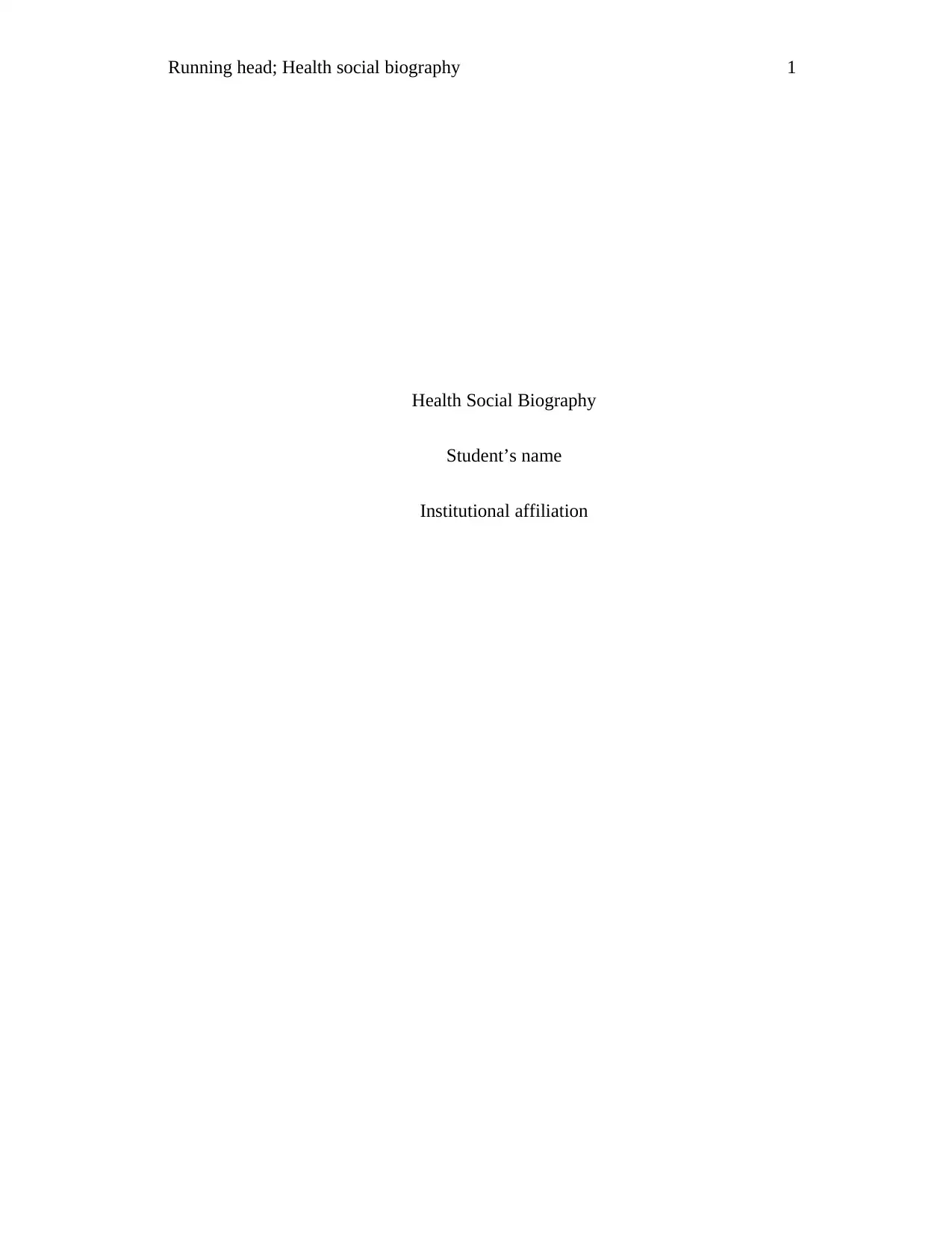
Running head; Health social biography 1
Health Social Biography
Student’s name
Institutional affiliation
Health Social Biography
Student’s name
Institutional affiliation
Paraphrase This Document
Need a fresh take? Get an instant paraphrase of this document with our AI Paraphraser
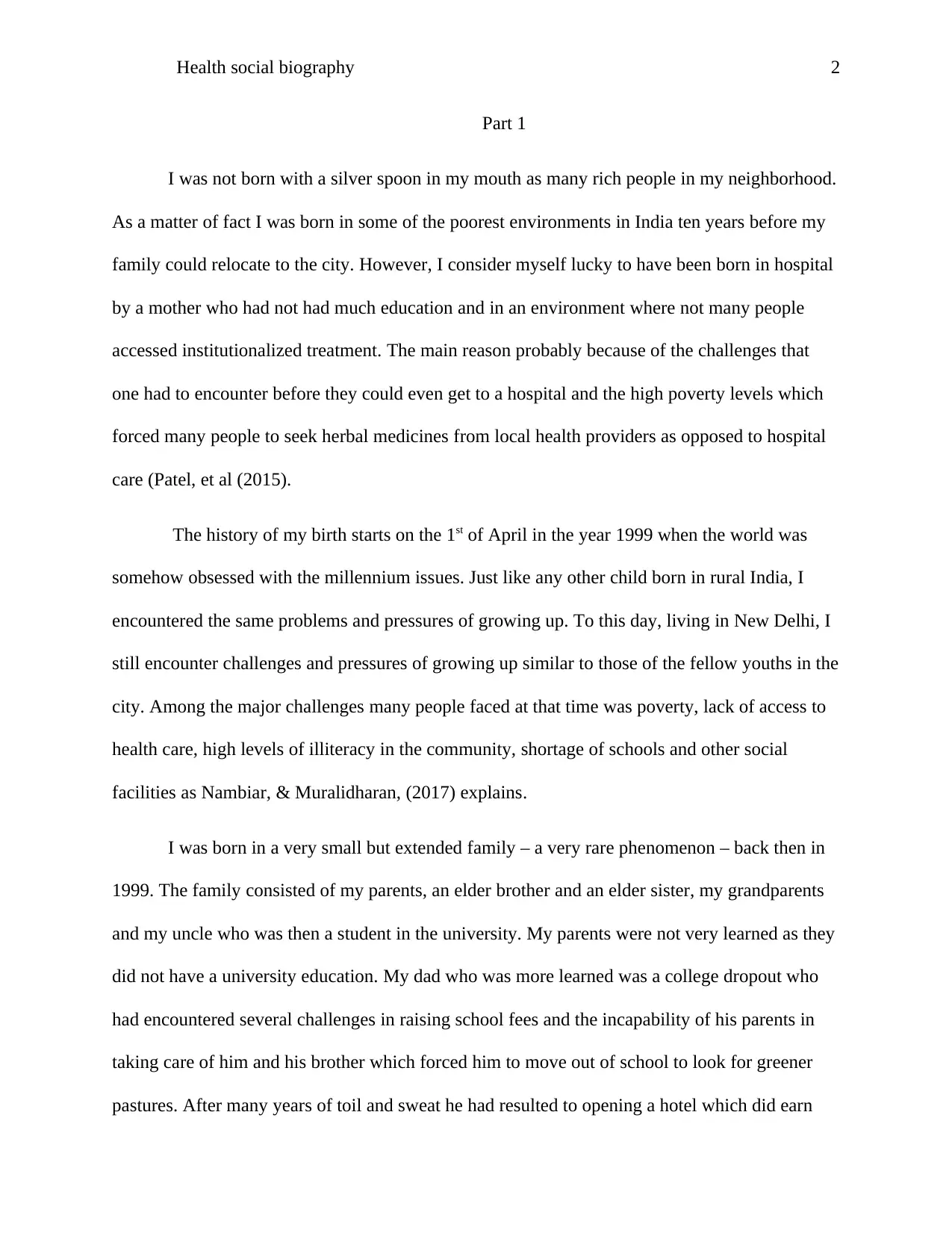
Health social biography 2
Part 1
I was not born with a silver spoon in my mouth as many rich people in my neighborhood.
As a matter of fact I was born in some of the poorest environments in India ten years before my
family could relocate to the city. However, I consider myself lucky to have been born in hospital
by a mother who had not had much education and in an environment where not many people
accessed institutionalized treatment. The main reason probably because of the challenges that
one had to encounter before they could even get to a hospital and the high poverty levels which
forced many people to seek herbal medicines from local health providers as opposed to hospital
care (Patel, et al (2015).
The history of my birth starts on the 1st of April in the year 1999 when the world was
somehow obsessed with the millennium issues. Just like any other child born in rural India, I
encountered the same problems and pressures of growing up. To this day, living in New Delhi, I
still encounter challenges and pressures of growing up similar to those of the fellow youths in the
city. Among the major challenges many people faced at that time was poverty, lack of access to
health care, high levels of illiteracy in the community, shortage of schools and other social
facilities as Nambiar, & Muralidharan, (2017) explains.
I was born in a very small but extended family – a very rare phenomenon – back then in
1999. The family consisted of my parents, an elder brother and an elder sister, my grandparents
and my uncle who was then a student in the university. My parents were not very learned as they
did not have a university education. My dad who was more learned was a college dropout who
had encountered several challenges in raising school fees and the incapability of his parents in
taking care of him and his brother which forced him to move out of school to look for greener
pastures. After many years of toil and sweat he had resulted to opening a hotel which did earn
Part 1
I was not born with a silver spoon in my mouth as many rich people in my neighborhood.
As a matter of fact I was born in some of the poorest environments in India ten years before my
family could relocate to the city. However, I consider myself lucky to have been born in hospital
by a mother who had not had much education and in an environment where not many people
accessed institutionalized treatment. The main reason probably because of the challenges that
one had to encounter before they could even get to a hospital and the high poverty levels which
forced many people to seek herbal medicines from local health providers as opposed to hospital
care (Patel, et al (2015).
The history of my birth starts on the 1st of April in the year 1999 when the world was
somehow obsessed with the millennium issues. Just like any other child born in rural India, I
encountered the same problems and pressures of growing up. To this day, living in New Delhi, I
still encounter challenges and pressures of growing up similar to those of the fellow youths in the
city. Among the major challenges many people faced at that time was poverty, lack of access to
health care, high levels of illiteracy in the community, shortage of schools and other social
facilities as Nambiar, & Muralidharan, (2017) explains.
I was born in a very small but extended family – a very rare phenomenon – back then in
1999. The family consisted of my parents, an elder brother and an elder sister, my grandparents
and my uncle who was then a student in the university. My parents were not very learned as they
did not have a university education. My dad who was more learned was a college dropout who
had encountered several challenges in raising school fees and the incapability of his parents in
taking care of him and his brother which forced him to move out of school to look for greener
pastures. After many years of toil and sweat he had resulted to opening a hotel which did earn
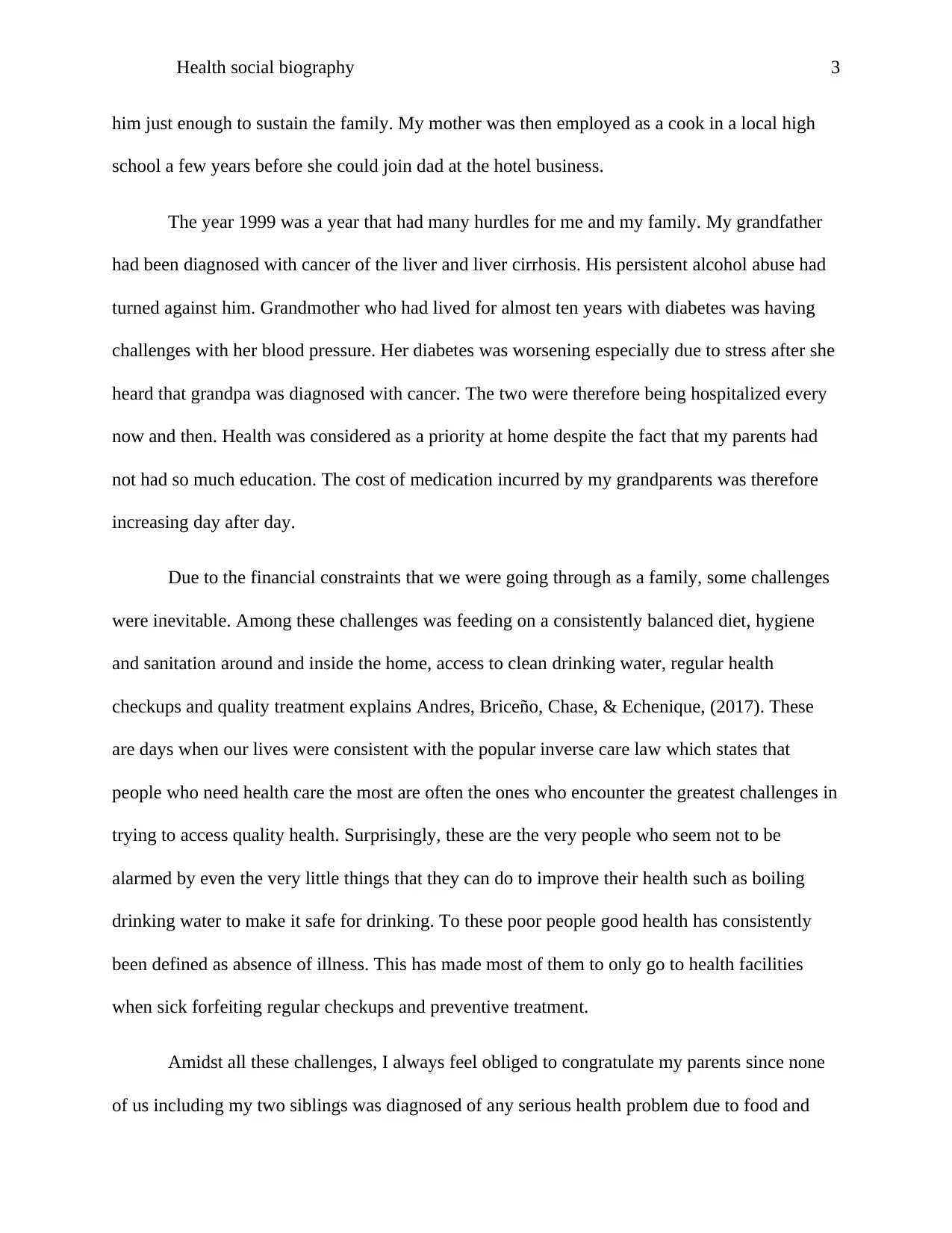
Health social biography 3
him just enough to sustain the family. My mother was then employed as a cook in a local high
school a few years before she could join dad at the hotel business.
The year 1999 was a year that had many hurdles for me and my family. My grandfather
had been diagnosed with cancer of the liver and liver cirrhosis. His persistent alcohol abuse had
turned against him. Grandmother who had lived for almost ten years with diabetes was having
challenges with her blood pressure. Her diabetes was worsening especially due to stress after she
heard that grandpa was diagnosed with cancer. The two were therefore being hospitalized every
now and then. Health was considered as a priority at home despite the fact that my parents had
not had so much education. The cost of medication incurred by my grandparents was therefore
increasing day after day.
Due to the financial constraints that we were going through as a family, some challenges
were inevitable. Among these challenges was feeding on a consistently balanced diet, hygiene
and sanitation around and inside the home, access to clean drinking water, regular health
checkups and quality treatment explains Andres, Briceño, Chase, & Echenique, (2017). These
are days when our lives were consistent with the popular inverse care law which states that
people who need health care the most are often the ones who encounter the greatest challenges in
trying to access quality health. Surprisingly, these are the very people who seem not to be
alarmed by even the very little things that they can do to improve their health such as boiling
drinking water to make it safe for drinking. To these poor people good health has consistently
been defined as absence of illness. This has made most of them to only go to health facilities
when sick forfeiting regular checkups and preventive treatment.
Amidst all these challenges, I always feel obliged to congratulate my parents since none
of us including my two siblings was diagnosed of any serious health problem due to food and
him just enough to sustain the family. My mother was then employed as a cook in a local high
school a few years before she could join dad at the hotel business.
The year 1999 was a year that had many hurdles for me and my family. My grandfather
had been diagnosed with cancer of the liver and liver cirrhosis. His persistent alcohol abuse had
turned against him. Grandmother who had lived for almost ten years with diabetes was having
challenges with her blood pressure. Her diabetes was worsening especially due to stress after she
heard that grandpa was diagnosed with cancer. The two were therefore being hospitalized every
now and then. Health was considered as a priority at home despite the fact that my parents had
not had so much education. The cost of medication incurred by my grandparents was therefore
increasing day after day.
Due to the financial constraints that we were going through as a family, some challenges
were inevitable. Among these challenges was feeding on a consistently balanced diet, hygiene
and sanitation around and inside the home, access to clean drinking water, regular health
checkups and quality treatment explains Andres, Briceño, Chase, & Echenique, (2017). These
are days when our lives were consistent with the popular inverse care law which states that
people who need health care the most are often the ones who encounter the greatest challenges in
trying to access quality health. Surprisingly, these are the very people who seem not to be
alarmed by even the very little things that they can do to improve their health such as boiling
drinking water to make it safe for drinking. To these poor people good health has consistently
been defined as absence of illness. This has made most of them to only go to health facilities
when sick forfeiting regular checkups and preventive treatment.
Amidst all these challenges, I always feel obliged to congratulate my parents since none
of us including my two siblings was diagnosed of any serious health problem due to food and
⊘ This is a preview!⊘
Do you want full access?
Subscribe today to unlock all pages.

Trusted by 1+ million students worldwide
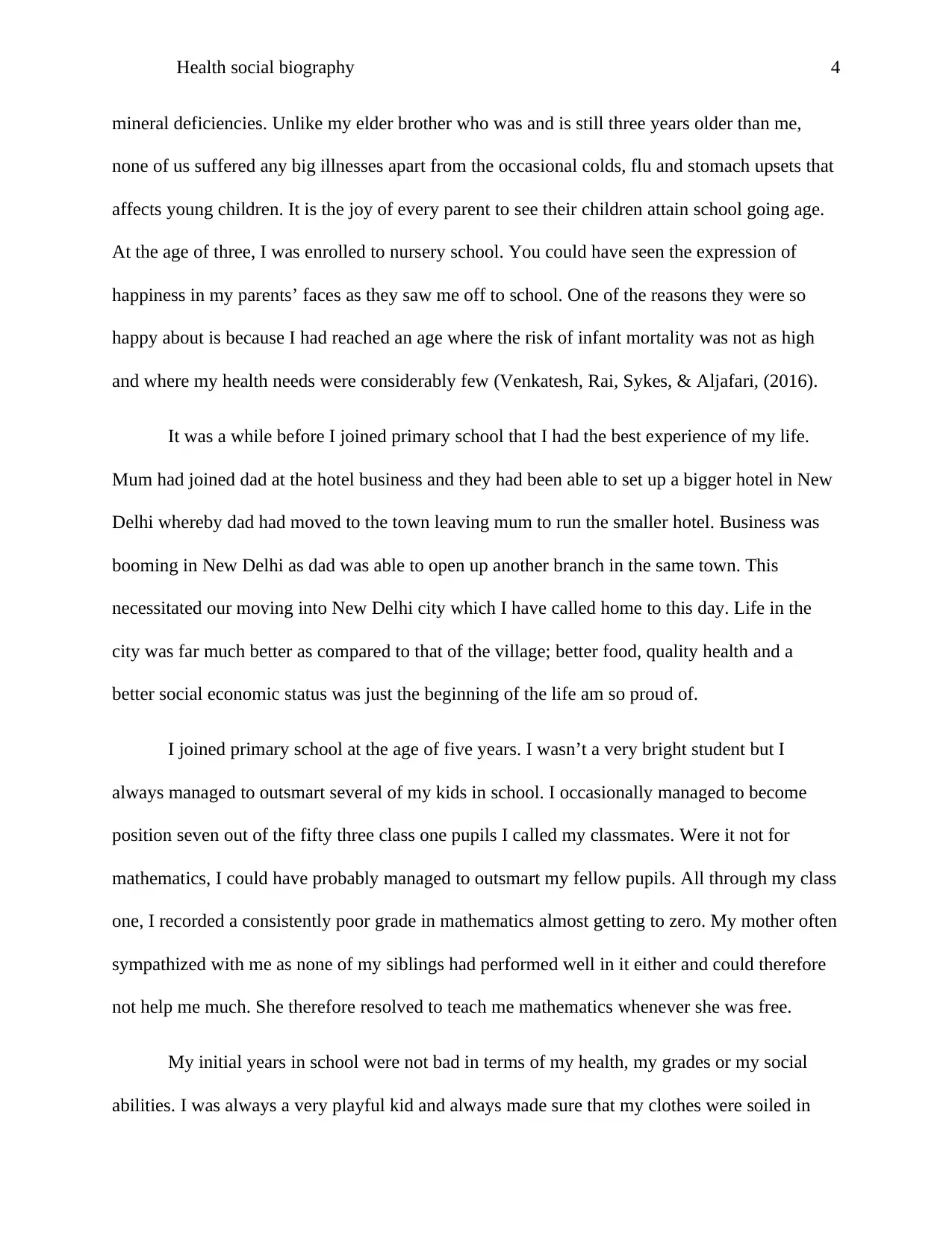
Health social biography 4
mineral deficiencies. Unlike my elder brother who was and is still three years older than me,
none of us suffered any big illnesses apart from the occasional colds, flu and stomach upsets that
affects young children. It is the joy of every parent to see their children attain school going age.
At the age of three, I was enrolled to nursery school. You could have seen the expression of
happiness in my parents’ faces as they saw me off to school. One of the reasons they were so
happy about is because I had reached an age where the risk of infant mortality was not as high
and where my health needs were considerably few (Venkatesh, Rai, Sykes, & Aljafari, (2016).
It was a while before I joined primary school that I had the best experience of my life.
Mum had joined dad at the hotel business and they had been able to set up a bigger hotel in New
Delhi whereby dad had moved to the town leaving mum to run the smaller hotel. Business was
booming in New Delhi as dad was able to open up another branch in the same town. This
necessitated our moving into New Delhi city which I have called home to this day. Life in the
city was far much better as compared to that of the village; better food, quality health and a
better social economic status was just the beginning of the life am so proud of.
I joined primary school at the age of five years. I wasn’t a very bright student but I
always managed to outsmart several of my kids in school. I occasionally managed to become
position seven out of the fifty three class one pupils I called my classmates. Were it not for
mathematics, I could have probably managed to outsmart my fellow pupils. All through my class
one, I recorded a consistently poor grade in mathematics almost getting to zero. My mother often
sympathized with me as none of my siblings had performed well in it either and could therefore
not help me much. She therefore resolved to teach me mathematics whenever she was free.
My initial years in school were not bad in terms of my health, my grades or my social
abilities. I was always a very playful kid and always made sure that my clothes were soiled in
mineral deficiencies. Unlike my elder brother who was and is still three years older than me,
none of us suffered any big illnesses apart from the occasional colds, flu and stomach upsets that
affects young children. It is the joy of every parent to see their children attain school going age.
At the age of three, I was enrolled to nursery school. You could have seen the expression of
happiness in my parents’ faces as they saw me off to school. One of the reasons they were so
happy about is because I had reached an age where the risk of infant mortality was not as high
and where my health needs were considerably few (Venkatesh, Rai, Sykes, & Aljafari, (2016).
It was a while before I joined primary school that I had the best experience of my life.
Mum had joined dad at the hotel business and they had been able to set up a bigger hotel in New
Delhi whereby dad had moved to the town leaving mum to run the smaller hotel. Business was
booming in New Delhi as dad was able to open up another branch in the same town. This
necessitated our moving into New Delhi city which I have called home to this day. Life in the
city was far much better as compared to that of the village; better food, quality health and a
better social economic status was just the beginning of the life am so proud of.
I joined primary school at the age of five years. I wasn’t a very bright student but I
always managed to outsmart several of my kids in school. I occasionally managed to become
position seven out of the fifty three class one pupils I called my classmates. Were it not for
mathematics, I could have probably managed to outsmart my fellow pupils. All through my class
one, I recorded a consistently poor grade in mathematics almost getting to zero. My mother often
sympathized with me as none of my siblings had performed well in it either and could therefore
not help me much. She therefore resolved to teach me mathematics whenever she was free.
My initial years in school were not bad in terms of my health, my grades or my social
abilities. I was always a very playful kid and always made sure that my clothes were soiled in
Paraphrase This Document
Need a fresh take? Get an instant paraphrase of this document with our AI Paraphraser
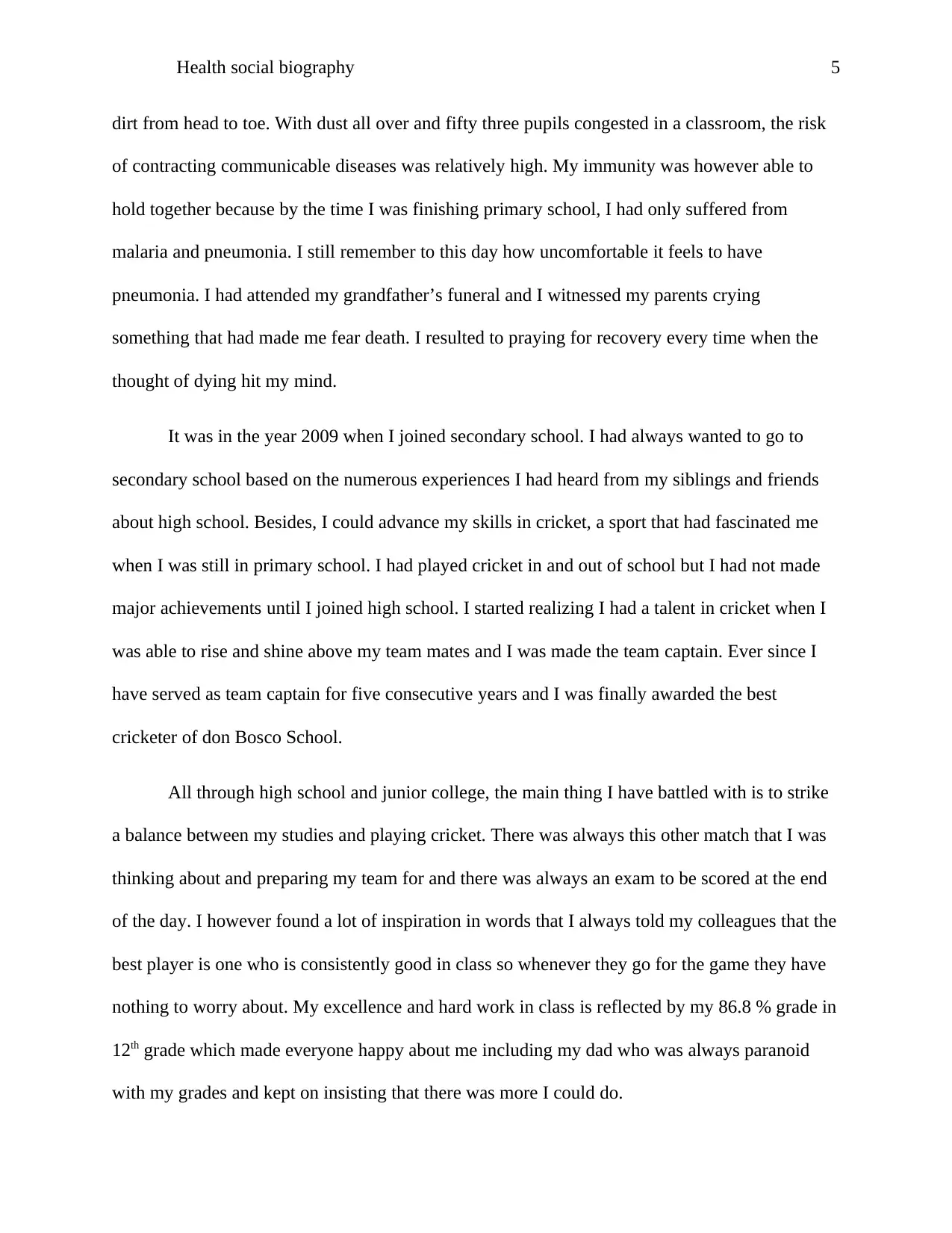
Health social biography 5
dirt from head to toe. With dust all over and fifty three pupils congested in a classroom, the risk
of contracting communicable diseases was relatively high. My immunity was however able to
hold together because by the time I was finishing primary school, I had only suffered from
malaria and pneumonia. I still remember to this day how uncomfortable it feels to have
pneumonia. I had attended my grandfather’s funeral and I witnessed my parents crying
something that had made me fear death. I resulted to praying for recovery every time when the
thought of dying hit my mind.
It was in the year 2009 when I joined secondary school. I had always wanted to go to
secondary school based on the numerous experiences I had heard from my siblings and friends
about high school. Besides, I could advance my skills in cricket, a sport that had fascinated me
when I was still in primary school. I had played cricket in and out of school but I had not made
major achievements until I joined high school. I started realizing I had a talent in cricket when I
was able to rise and shine above my team mates and I was made the team captain. Ever since I
have served as team captain for five consecutive years and I was finally awarded the best
cricketer of don Bosco School.
All through high school and junior college, the main thing I have battled with is to strike
a balance between my studies and playing cricket. There was always this other match that I was
thinking about and preparing my team for and there was always an exam to be scored at the end
of the day. I however found a lot of inspiration in words that I always told my colleagues that the
best player is one who is consistently good in class so whenever they go for the game they have
nothing to worry about. My excellence and hard work in class is reflected by my 86.8 % grade in
12th grade which made everyone happy about me including my dad who was always paranoid
with my grades and kept on insisting that there was more I could do.
dirt from head to toe. With dust all over and fifty three pupils congested in a classroom, the risk
of contracting communicable diseases was relatively high. My immunity was however able to
hold together because by the time I was finishing primary school, I had only suffered from
malaria and pneumonia. I still remember to this day how uncomfortable it feels to have
pneumonia. I had attended my grandfather’s funeral and I witnessed my parents crying
something that had made me fear death. I resulted to praying for recovery every time when the
thought of dying hit my mind.
It was in the year 2009 when I joined secondary school. I had always wanted to go to
secondary school based on the numerous experiences I had heard from my siblings and friends
about high school. Besides, I could advance my skills in cricket, a sport that had fascinated me
when I was still in primary school. I had played cricket in and out of school but I had not made
major achievements until I joined high school. I started realizing I had a talent in cricket when I
was able to rise and shine above my team mates and I was made the team captain. Ever since I
have served as team captain for five consecutive years and I was finally awarded the best
cricketer of don Bosco School.
All through high school and junior college, the main thing I have battled with is to strike
a balance between my studies and playing cricket. There was always this other match that I was
thinking about and preparing my team for and there was always an exam to be scored at the end
of the day. I however found a lot of inspiration in words that I always told my colleagues that the
best player is one who is consistently good in class so whenever they go for the game they have
nothing to worry about. My excellence and hard work in class is reflected by my 86.8 % grade in
12th grade which made everyone happy about me including my dad who was always paranoid
with my grades and kept on insisting that there was more I could do.
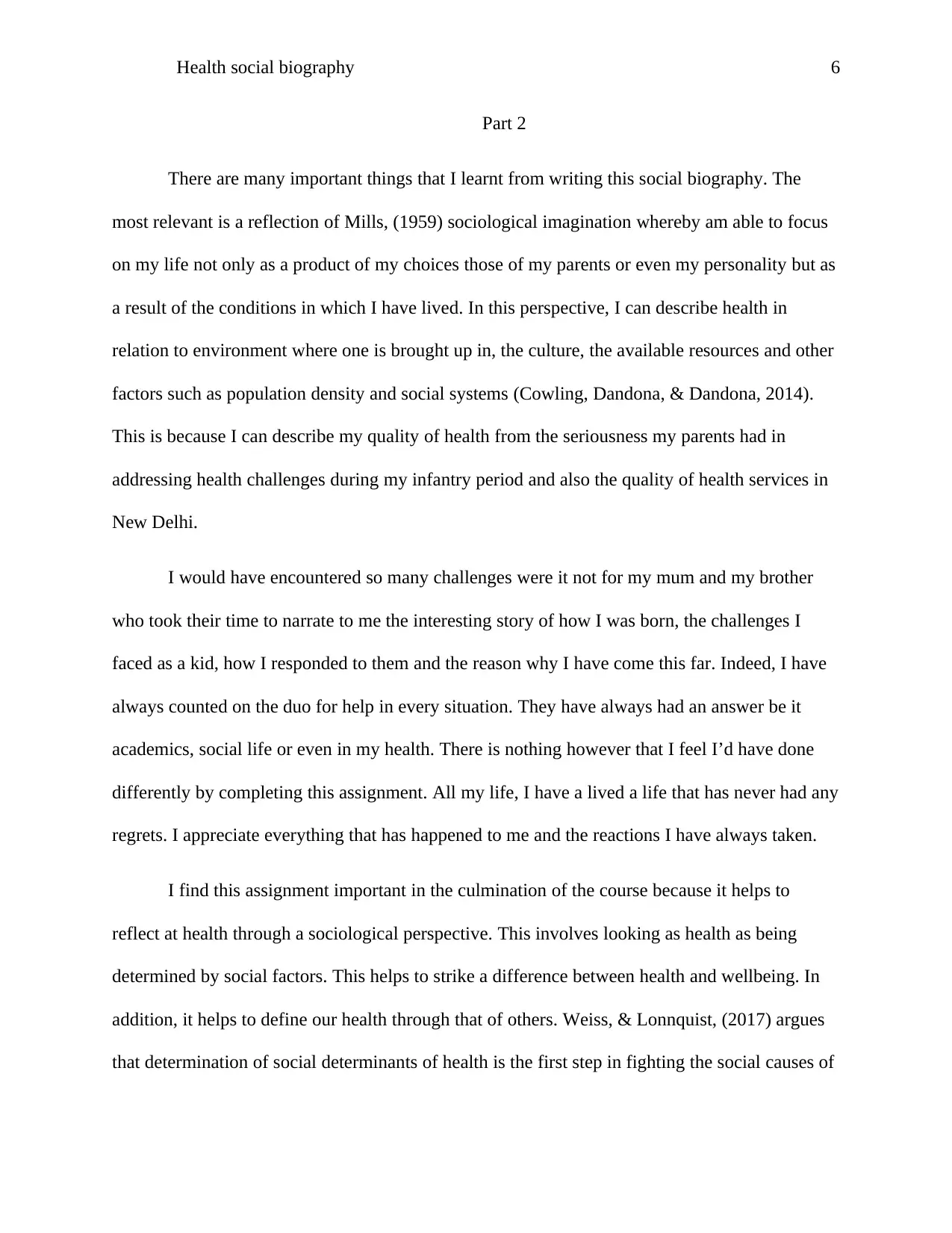
Health social biography 6
Part 2
There are many important things that I learnt from writing this social biography. The
most relevant is a reflection of Mills, (1959) sociological imagination whereby am able to focus
on my life not only as a product of my choices those of my parents or even my personality but as
a result of the conditions in which I have lived. In this perspective, I can describe health in
relation to environment where one is brought up in, the culture, the available resources and other
factors such as population density and social systems (Cowling, Dandona, & Dandona, 2014).
This is because I can describe my quality of health from the seriousness my parents had in
addressing health challenges during my infantry period and also the quality of health services in
New Delhi.
I would have encountered so many challenges were it not for my mum and my brother
who took their time to narrate to me the interesting story of how I was born, the challenges I
faced as a kid, how I responded to them and the reason why I have come this far. Indeed, I have
always counted on the duo for help in every situation. They have always had an answer be it
academics, social life or even in my health. There is nothing however that I feel I’d have done
differently by completing this assignment. All my life, I have a lived a life that has never had any
regrets. I appreciate everything that has happened to me and the reactions I have always taken.
I find this assignment important in the culmination of the course because it helps to
reflect at health through a sociological perspective. This involves looking as health as being
determined by social factors. This helps to strike a difference between health and wellbeing. In
addition, it helps to define our health through that of others. Weiss, & Lonnquist, (2017) argues
that determination of social determinants of health is the first step in fighting the social causes of
Part 2
There are many important things that I learnt from writing this social biography. The
most relevant is a reflection of Mills, (1959) sociological imagination whereby am able to focus
on my life not only as a product of my choices those of my parents or even my personality but as
a result of the conditions in which I have lived. In this perspective, I can describe health in
relation to environment where one is brought up in, the culture, the available resources and other
factors such as population density and social systems (Cowling, Dandona, & Dandona, 2014).
This is because I can describe my quality of health from the seriousness my parents had in
addressing health challenges during my infantry period and also the quality of health services in
New Delhi.
I would have encountered so many challenges were it not for my mum and my brother
who took their time to narrate to me the interesting story of how I was born, the challenges I
faced as a kid, how I responded to them and the reason why I have come this far. Indeed, I have
always counted on the duo for help in every situation. They have always had an answer be it
academics, social life or even in my health. There is nothing however that I feel I’d have done
differently by completing this assignment. All my life, I have a lived a life that has never had any
regrets. I appreciate everything that has happened to me and the reactions I have always taken.
I find this assignment important in the culmination of the course because it helps to
reflect at health through a sociological perspective. This involves looking as health as being
determined by social factors. This helps to strike a difference between health and wellbeing. In
addition, it helps to define our health through that of others. Weiss, & Lonnquist, (2017) argues
that determination of social determinants of health is the first step in fighting the social causes of
⊘ This is a preview!⊘
Do you want full access?
Subscribe today to unlock all pages.

Trusted by 1+ million students worldwide
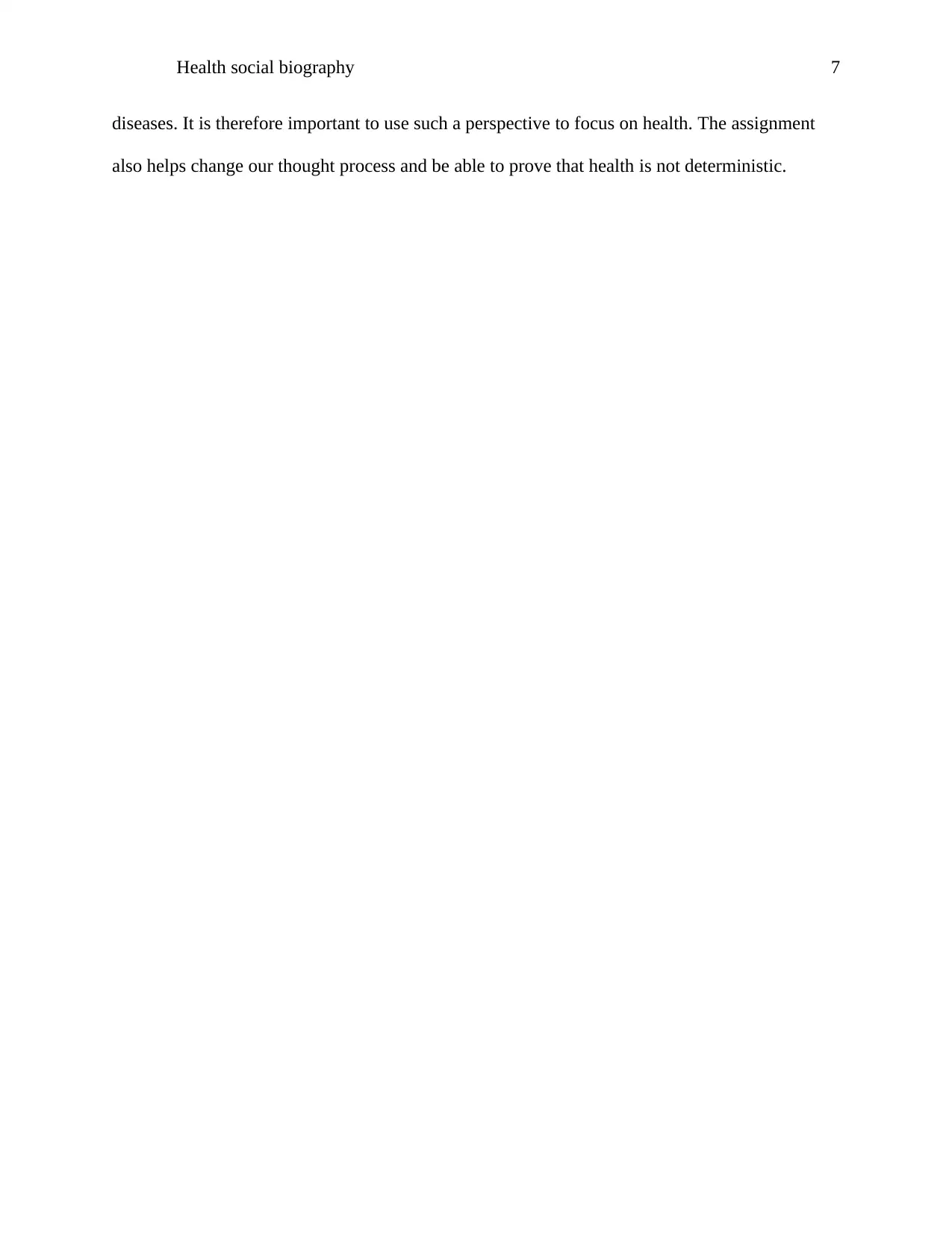
Health social biography 7
diseases. It is therefore important to use such a perspective to focus on health. The assignment
also helps change our thought process and be able to prove that health is not deterministic.
diseases. It is therefore important to use such a perspective to focus on health. The assignment
also helps change our thought process and be able to prove that health is not deterministic.
Paraphrase This Document
Need a fresh take? Get an instant paraphrase of this document with our AI Paraphraser
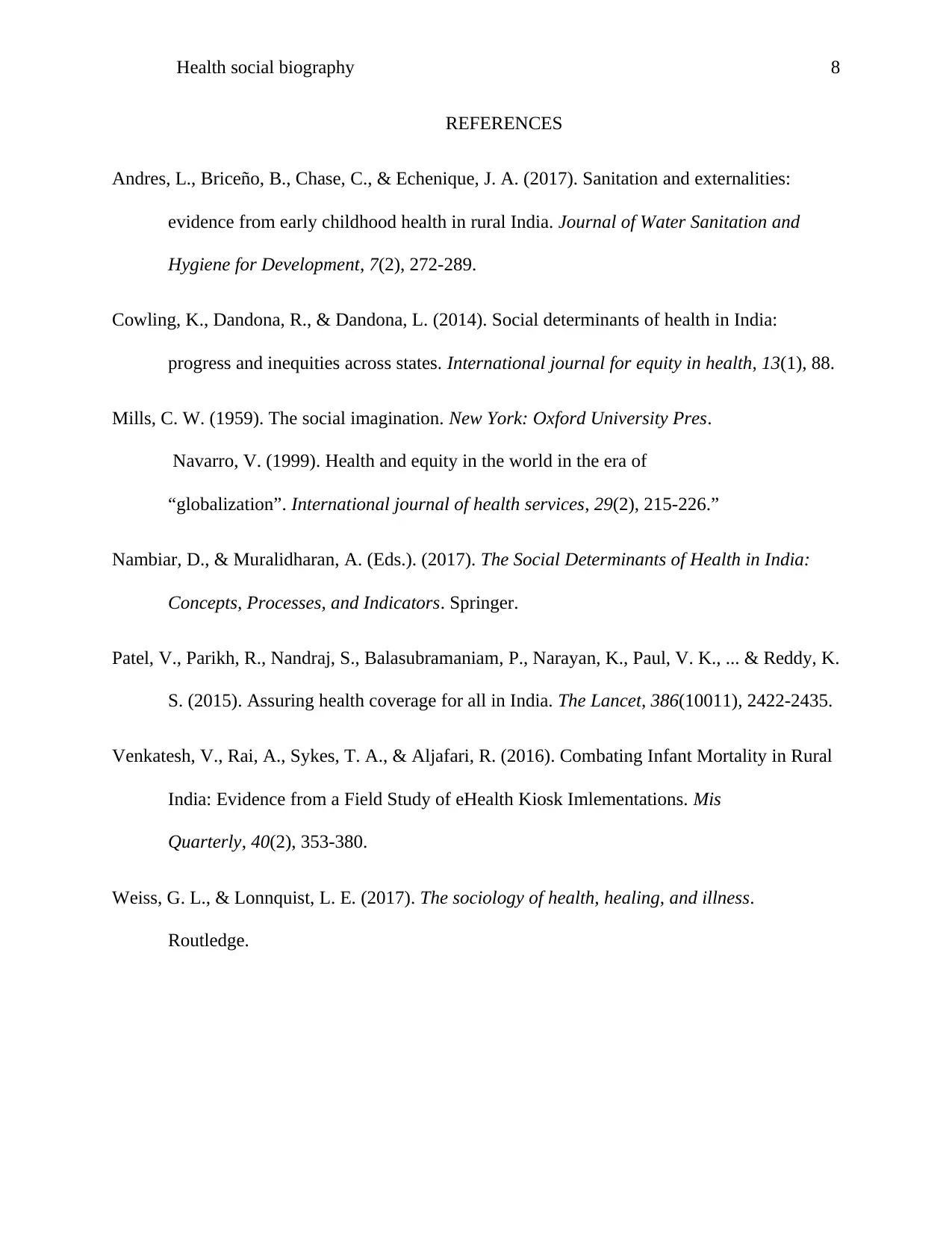
Health social biography 8
REFERENCES
Andres, L., Briceño, B., Chase, C., & Echenique, J. A. (2017). Sanitation and externalities:
evidence from early childhood health in rural India. Journal of Water Sanitation and
Hygiene for Development, 7(2), 272-289.
Cowling, K., Dandona, R., & Dandona, L. (2014). Social determinants of health in India:
progress and inequities across states. International journal for equity in health, 13(1), 88.
Mills, C. W. (1959). The social imagination. New York: Oxford University Pres.
Navarro, V. (1999). Health and equity in the world in the era of
“globalization”. International journal of health services, 29(2), 215-226.”
Nambiar, D., & Muralidharan, A. (Eds.). (2017). The Social Determinants of Health in India:
Concepts, Processes, and Indicators. Springer.
Patel, V., Parikh, R., Nandraj, S., Balasubramaniam, P., Narayan, K., Paul, V. K., ... & Reddy, K.
S. (2015). Assuring health coverage for all in India. The Lancet, 386(10011), 2422-2435.
Venkatesh, V., Rai, A., Sykes, T. A., & Aljafari, R. (2016). Combating Infant Mortality in Rural
India: Evidence from a Field Study of eHealth Kiosk Imlementations. Mis
Quarterly, 40(2), 353-380.
Weiss, G. L., & Lonnquist, L. E. (2017). The sociology of health, healing, and illness.
Routledge.
REFERENCES
Andres, L., Briceño, B., Chase, C., & Echenique, J. A. (2017). Sanitation and externalities:
evidence from early childhood health in rural India. Journal of Water Sanitation and
Hygiene for Development, 7(2), 272-289.
Cowling, K., Dandona, R., & Dandona, L. (2014). Social determinants of health in India:
progress and inequities across states. International journal for equity in health, 13(1), 88.
Mills, C. W. (1959). The social imagination. New York: Oxford University Pres.
Navarro, V. (1999). Health and equity in the world in the era of
“globalization”. International journal of health services, 29(2), 215-226.”
Nambiar, D., & Muralidharan, A. (Eds.). (2017). The Social Determinants of Health in India:
Concepts, Processes, and Indicators. Springer.
Patel, V., Parikh, R., Nandraj, S., Balasubramaniam, P., Narayan, K., Paul, V. K., ... & Reddy, K.
S. (2015). Assuring health coverage for all in India. The Lancet, 386(10011), 2422-2435.
Venkatesh, V., Rai, A., Sykes, T. A., & Aljafari, R. (2016). Combating Infant Mortality in Rural
India: Evidence from a Field Study of eHealth Kiosk Imlementations. Mis
Quarterly, 40(2), 353-380.
Weiss, G. L., & Lonnquist, L. E. (2017). The sociology of health, healing, and illness.
Routledge.
1 out of 8
Related Documents
Your All-in-One AI-Powered Toolkit for Academic Success.
+13062052269
info@desklib.com
Available 24*7 on WhatsApp / Email
![[object Object]](/_next/static/media/star-bottom.7253800d.svg)
Unlock your academic potential
Copyright © 2020–2026 A2Z Services. All Rights Reserved. Developed and managed by ZUCOL.




